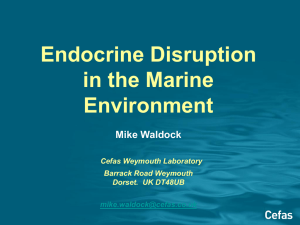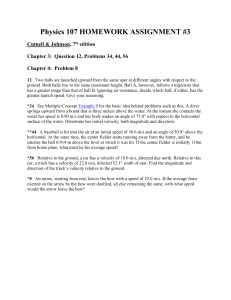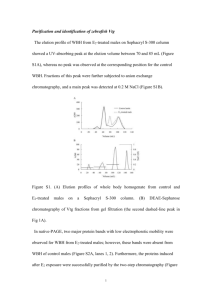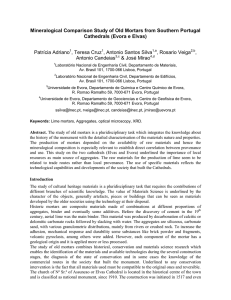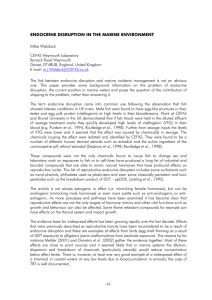Document 14415507
advertisement
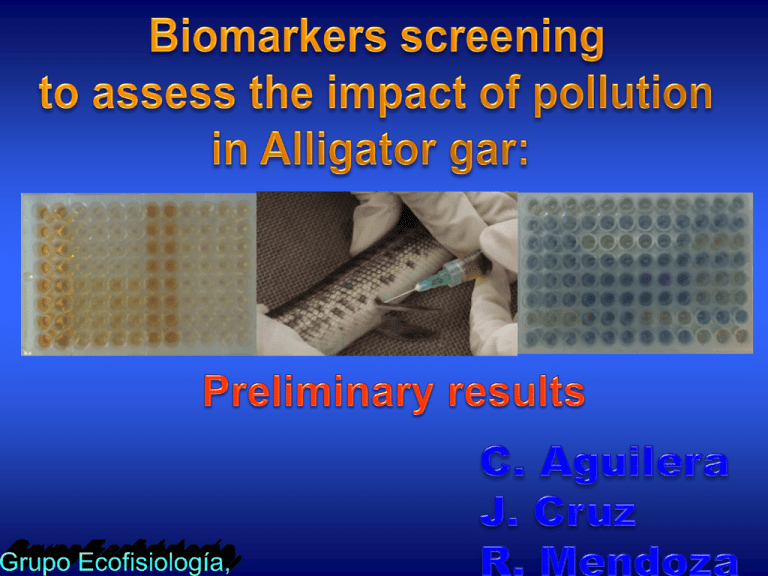
COMMERCIAL FISHING ENVIROMENTAL POLLUTION ASSESSMENT RESTOCKING OF NATURAL HABITATS JUVENILES FROM AQUACULTURE SPORT FISHING COMMERCIAL AQUACULTURE DIGESTIVE ENZYMES AQUARIUM TRADE BYPRODUCTS UTILIZATION HANDYCRAFTS & TROPHEES • Native species from the Atlantic coast of North America • Top position in the food web and occasional scavenger • Availability of individuals raised under controlled conditions • High metabolic rate (e.g. growth) • Able to tolerate different physicochemical conditions (e.g.saltwater, O2, ammonia, etc) • Continuous contact with the bottom • Ancient fish (simple metabolic pathways) Establishment of lab and field methodologies to asses the impact of aquatic pollution by means of biomarkers in Alligator gar (A. spatula) 1) BIOMARKERS SELECTION: Implementing lab techniques for the evaluation of different biomarkers Determining the response of alligator gar, of different ages to known environmental disruptors 1) Esterases • Carboxylesterases • Acetyl cholinesterase • Butiryl cholinesterase 1) Detoxification Cytochrome P450 (CYP1A) 2) Detoxification Glutathione S-transferase 2) Endocrine Disruption Vitellogenin (VTG) 3) Oxidative stress Superoxide Dismutase 4) Tissue injury Alkaline phosphatase Alligator gar: 3/Treatments 1) Hydrocarbure (H) 1 year: 60 g; 23 cm b-naphtophlavone 2 years: 309 g; 38 cm 2) Pesticide (P) Treatments application Organophosphorate 50 mg/1000g in fish oil (Diazinon) Intraperitoneal injection 3) Endocrine Disruptor (ED) (exposure: 48 h) 17b-Estradiol Tissue samples: 4) Control (C) Liver (L); Plasma (P); Fish Oil Gills (G); Mucus (M) (Menhaden Oil) ALLIGATOR GAR F I L T E R 500 L Fiber glass tanks Biomarker Determination Treatment application (50 mg / 1000 g) Tissue sample Sample in liquid N2 •A group of isozymes mainly located in RER •Involved in metabolism of a wide variety of xenobiotics containing esther, thioesther and amide groups. •Highest affinity for pesticides than related family of cholinesterases (acetyl and butiryl) •Pesticides cause activity inhibition in most tissues • e.g. Liver •Other xenobiotics cause Increase of activity ASSAY METHOD Enzyme kinetics in 96-well microtiter plate using p-nitrophenyl acetate as substrate (Munilla & Starck, 1990) 0.02 ml 0.2 ml substrate 0.02 ml Buffer Plus Abs. 405 nm 10 min. Enzyme extract Carboxylesterase activity in 1 year alligator gar 0.6 A Abs/min/mg protein 0.5 0.4 B B L G 0.3 0.2 0.1 A A A 0 ED H Treatments C Carboxylesterase activity in 2 years alligator gar 0.6 A A A Abs/min/mg protein 0.5 0.4 B 0.3 A A B AB 0.2 0.1 A A A A 0 ED H C Treatments P P L G •Nonspecific phosphomono-esterase that removes a phosphate group and transfers it to other molecules. •Pollutants cause activity variation in several tissues. •Increased activity in the plasma in a variety of disease conditions. •Biomarker of tissue injury. ASSAY METHOD Enzyme kinetics in 96-well microtiter plate using 4-nitrophenyl phosphate as substrate (Moyano et al , 1996) 0.02 ml 0.2 ml substrate 0.02 ml Buffer Plus Abs. 405 nm 10 min. Enzyme extract Alkaline phosphatase activity in 1 year alligator gar 1.2 A Abs/min/mg protein 1 B 0.8 B L G 0.6 0.4 0.2 A A A 0 ED H Treatments C Alkaline phosphatase activity in 2 years alligator gar 1.6 A Abs/min/mg protein 1.4 1.2 AB A B 1 A A 0.8 L G A B 0.6 0.4 0.2 0 ED H C Treatments P •Vtg is an estrogen-inducible protein synthesized by the liver. •Males do not produce Vtg in measurable quantities under normal conditions, however have the capacity to synthesize it. •Many chemicals that are released into the environment possess estrogenic properties. •Measurement of Vtg in males and juveniles provides an excellent biomarker for estrogenic compounds. VTG VTG Alligator gar VTG VTG VTG defatted milk VTG VTG Incubation immobilization washing VTG Saturation washing VTG VTG + VTG VTG VTG VTG Competition washing Secondary antibody METHOD: Homologus competitive ELISA (Mendoza et al., In Press) VTG VTG VTG washing incubation enzyme substrate OPD VTG VTG VTG VTG Standar Vtg or Sample anti-VTG Optical density measure ng de vtg/mg protein VTG concentration in 1 year Alligator gar 100 90 80 70 60 50 40 30 20 10 0 A L G M A A ED B B B B H C Treatments VTG concentration in 2 years alligator gar ng vtg/mg protein 120 A 100 80 P L 60 G B 40 B M B 20 0 ED H C Treatments P Environmental disruptor Biomarker Hydrocarbure Carboxyl esterase Alkaline phosphatase Vitellogenin Slight Reduction (1 year) Slight Reduction Pesticide Estrogenic Reduction Increase Increase Increase Increase

